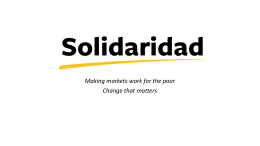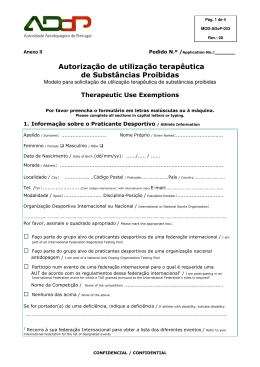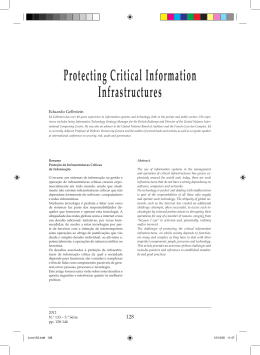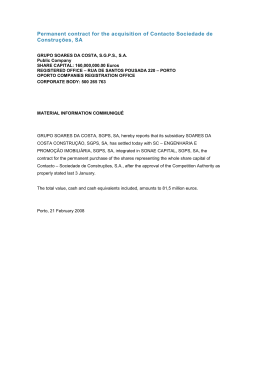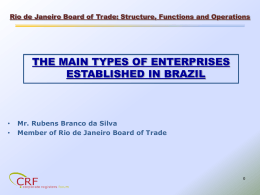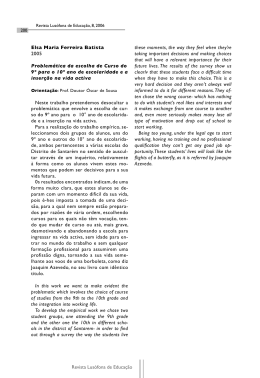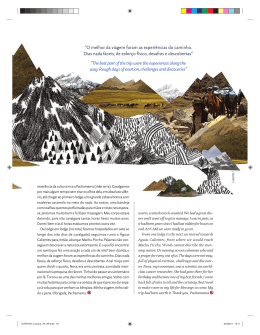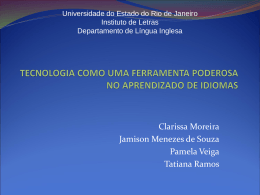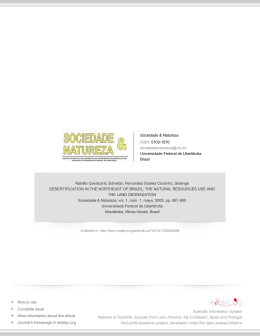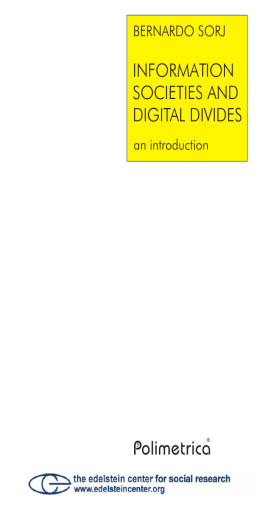Unesco diz que conceito de sociedade da informação está desatualizado e errado Aldo Barreto - UFRJ A Unesco em comunicação a imprensa de 3/11/2005 faz, pela primeira vez, uma forte diferenciação entre os conceitos de sociedade da informação e sociedade do conhecimento indicando que, em termos sociais e culturais, o conceito de sociedade da informação, como vem sendo usado, está não só desatualizado como errado. É um erro confundir a sociedade da informação com a sociedade do conhecimento. A Sociedade do conhecimento contribui para que o indivíduo se realize em sua realidade vivencial. Compreende configurações éticas e culturais e dimensões políticas. A sociedade da informação, por outro lado, está limitada a um avanço de novas técnicas devotadas para ao, almoxarifar e transferir, o que pode ser uma massa de dados indistintos para aqueles que, não tem as competências necessárias para se beneficiarem deste. tecnoespaço. Falando de uma forma ampla, assim como a sociedade industrial trouxe as tecnologias do vapor, a eletricidade e o motor a combustão para modificar o processo de produzir bens materiais a sociedade da informação ligou-se as tecnologias emergentes da microeletrônica e da telecomunicação para processar e reunir estoques de dados relacionados visando uma eventual transferência destes dados . Em nenhum momento a sociedade da informação pretendeu ser responsável pelo conhecimento gerado na sociedade. A sociedade da informação foi sempre uma tecnoutopia e nunca uma utopia para um conhecimento social ampliado. Há que cuidar quando se for usar o termo sociedade da informação, seu significado é simples e limitado comparado ao vigor dinâmico de uma ação completada de conhecimento. Knowledge versus information societies : UNESCO report takes stock of the difference 03-11-2005 2:40 pm A UNESCO report launched today urges governments to expand quality education for all, increase community access to information and communication technology, and improve cross-border scientific knowledge-sharing, in an effort to narrow the digital and "knowledge" divides between the North and South and move towards a "smart" form of sustainable human development. "Towards Knowledge Societies"*, launched in Paris today by UNESCO Director-General Koïchiro Matsuura, also advocates making linguistic diversity a priority, sharing environmental knowledge and developing statistical tools to measure knowledge and help policy makers define their priorities. Knowledge societies, the authors** stress, are not to be confused with information societies. Knowledge societies contribute to the well-being of individuals and communities, and encompass social, ethical and political dimensions. Singapore, for example, started out as a developing country of shantytowns at independence and achieved economic growth rates that surpass those of most industrialized nations in just four decades by promoting knowledge (education) and creativity. Less well known is Villa El Salvador in Peru, a community of several thousand people who were evicted from Lima in 1971. Settled in the desert, they built, without any outside assistance, schools and education centres and turned their slum into an organized town of more than 400,000 inhabitants. Ninety-eight percent of children in the town go to school, adult illiteracy is the lowest in the country at 4.5 percent and more than 15,000 students are enrolled in the University of Villa El Salvador or in universities in the capital, Lima. Information societies, on the other hand, are based on technological breakthroughs that risk providing little more than "a mass of indistinct data" for those who don't have the skills to benefit from it. The Report, opens a panorama "that paints the future in both promising and disquieting tones," says the Director-General, "promising because the potential offered by a rational and purposeful use of the new technologies offers real prospects for human and sustainable development and the building of more democratic societies; disquieting for the obstacles and snares along the way are all too real." One of the main obstacles, according to the Report, is the disparity in access to information and communication technology that has become known as the digital divide. Only 11 percent of the world's population has access to the internet and 90 percent of those connected live in industrialized countries. This digital divide is itself the consequence of a more serious split. "The knowledge divide," write the authors, "today more than ever, separates countries endowed with powerful research and development potential, highly effective education systems and a range of public learning and cultural facilities, from nations with deficient education systems and research institutions starved of resources, and suffering as a result of the brain drain." Encouraging the development of knowledge societies requires overcoming these gaps, "consolidating two pillars of the global information society that are still too unevenly guaranteed - access to information for all and freedom of expression." Cultural and linguistic diversity are also central to the development of knowledge societies, say the authors, pointing out that local and traditional knowledge can be invaluable for agriculture and health, for example. This category of knowledge, often found in societies where no written language exists, is particularly vulnerable. With one language estimated to be dying out every two weeks, much of this traditional knowledge is being lost. Examples illustrating the utilisation of traditional knowledge, for instance in agriculture in Fiji, are included in the report. The stakes are high, stresses the Report, for the cost of ignorance is greater than the cost of education and knowledge sharing. It argues in favour of societies that are able to integrate all their members and promote new forms of solidarity involving both present and future generations. Nobody, it states, should be excluded from knowledge societies, where knowledge is a public good, available to each and every individual. * The first in a new series of World Reports, "Towards Knowledge Societies" will be presented at the World Summit on the Information Society (Tunis, November 16-18). The next World Report, scheduled for 2007, will examine cultural diversity **An international team of leading experts and intellectuals, directed by Jérôme Bindé, Deputy Assistant Director-General for Social and Human Sciences and Director of the Division of Foresight, Philosophy and Human Sciences at UNESCO, contributed to the World Report.
Download
